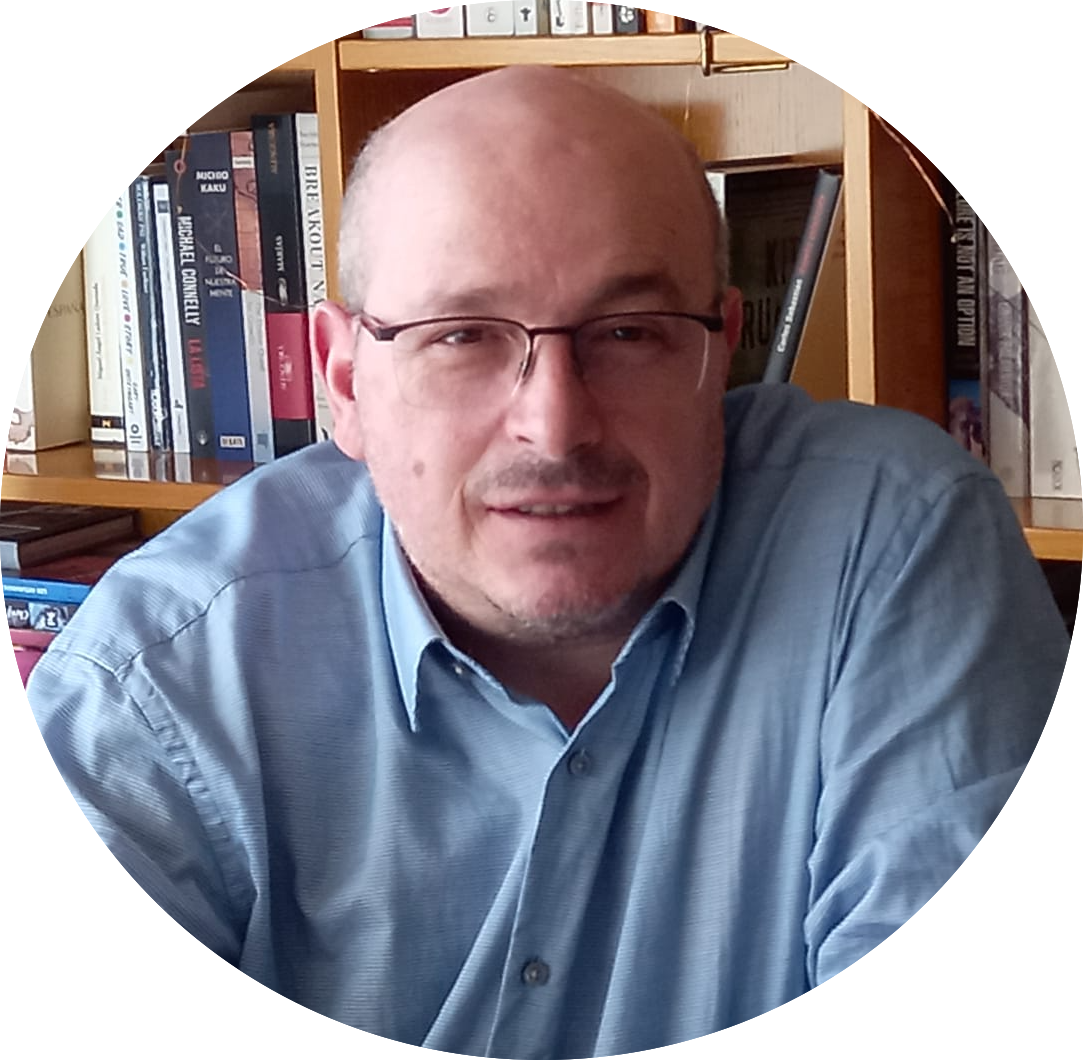
Prof. Yamir Moreno
(Group Leader)
Professor at the Department of Theoretical Physics, Faculty of Sciences, University of Zaragoza, Spain.
Research Director, CENTAI Institute, Turin, Italy.
External Professor, Complexity Science Hub Vienna, Austria.
Prof. Moreno’s field of research is in the theoretical foundations of complex systems, which he investigates using tools from mathematics, physics, and network
Prof. Moreno is the Editor in Chief of the Journal of Complex Networks, and Editor of PLoS Computational Biology, Chaos, Solitons, and Fractals, and Proceedings of the Royal Society A. He was a Divisional Associate Editor of Physical Review Letters (2014-2020), and editor of the New Journal of Physics, PLoS ONE, Scientific Reports, Applied Network Science, and Frontiers in Physics. He has also been the PI of 6 EU Projects, and is a regular reviewer for scientific journals and national and foreign research agencies. Prof. Moreno was a member of the Future and Emerging Technology Advisory Group of the EU Research Framework (from 2014-2018) and of the Advisory Board of the WHO Collaborative Center “Complexity Sciences for Health Systems” (CS4HS).
- Fellow of the Network Science Society. 2022.
- Service Award of the Complex Systems Society. 2022.
- Fellow of the American Physical Society. 2021.
- ISI WoK (Clarivate) Highly Cited Scientists (2019)
- Senior Scientific Award of the Complex Systems Society 2019.
- Institute for Scientific Interchange (Turin, Italy). Research Area Coordinator. 2017-2022.
- Elected President of the Network Science Society. June 2018.
- Elected President of the Complex Systems Society. September 2015.
- Vice-president Network Science Society. September 2015
- Divisional Associate Editor of Physical Review Letters. Since September 2014.
- Elected Vice-President of the Complex Systems Society. February 2014-September 2015.
- Member of the Future and Emerging Technology Advisory Group of the European Union’s Research Program: H2020. Feb. 2014- Janaury 2018.
- Institute for Scientific Interchange (Turin, Italy) Fellow. June 2013.
- Member of the NetSci Society Board. Since June 2013.
- Member of the Advisory Board of the WHO Collaborative Center “Complexity Sciences for Health Systems” (CS4HS), which is based on the Division of Mathematical Modeling at the University of British Columbia Centre for Disease Control, in Vancouver, British Columbia, Canada. Since March 2013.
- Elected member of the Executive Committee and Council of the Complex Systems Society.
- Author of the most cited paper from University of Zaragoza (Physics Reports 426, 175-306, 2006).
- Editorial Board Member of Nature Scientific Reports. Since September 2011.
- Scientific Secretary, Institute for Biocomputation and Physics of Complex Systems (BIFI), University of Zaragoza, Spain. Since February 2011.
- Academic Editor of PLoS ONE. Since January 2011.
- ISI WoK Highly Cited Scientist (i.e, within the top 1% of most cited scientists in Physics).
- Member of the Board and Steering Committees of the Institute for Biocomputation and Physics of Complex Systems (BIFI), University of Zaragoza. Since 2007.
- Head of the Research Lab: “Complex Systems and Networks”, Institute for Biocomputation and Physics of Complex Systems (BIFI), University of Zaragoza. Since 2003.
- Outstanding American Physical Society Reviewer (2009).
- Article “Evolutionary Game Dynamics in a Growing Structured Population”, New Journal of Physics, 11, 083031 (2009), selected “Best of 2009” by IoP.
- Plenary Speaker for the prestigious Conference Cycles of Cosmo-Caixa. Barcelona, October 2009. Subject: Natural Selection and Evolution.
- Outstanding Europhysics Letters Reviewer (2008).
- Member of the European Physical Society.
- Member of the European Complex Systems Society.
- Ramón y Cajal Fellow, 2005-2010.
- Guest Editor for the Special Issue of the New Journal of Physics “Complex Networked Systems: Theory and Applications”.
- Member of the Editorial Board of the Journal “Nova Scientia”.
- Editor of the Journal of Complex Systems in Science (2010-).
- PhD Fellowship from the Spanish Ministry of Foreign Affairs, 1997-2000.
- 1997 Outstanding Teaching Award of the Minister for Education, Havana, Cuba.
- Dr. Mario Tovar. Date of Dissertation: February, 2024. Mark: Highest mark of “Apto with proposition for Cum Laude”
- Dr. Alfonso de Miguel. Date of Dissertation: March, 2024. Mark: Highest mark of “Apto with proposition for Cum Laude”
- Dr. Claudia Martinez. (co-advised with A. Bermudez). PhD at Benemerita Universidad Autonoma de Puebla, Mexico. Date of Dissertation: April 2022.
- Dr. Dan Lu. Date of Dissertation: December, 2021. Mark: Highest mark of “Apto with proposition for Cum Laude”
- Dr. Claudia Payrato. Date of Dissertation: December, 2020. Mark: Highest mark of “Apto”
- Dr. Felipe Cardoso. Date of Dissertation: December, 2020. Mark: Highest mark of “Apto with proposition for Cum Laude”
- Dr. Alberto Aleta. Date of Dissertation: December, 2019. Mark: Highest mark of “Apto with proposition for Cum Laude”
- Dr. Sergio Arregui, “Modeling Tuberculosis spreading for the evaluation of new vaccines” (2018).
- Dr. Guilherme F de Arruda (from USP @Sao Carlos, co-supervised with F. A. Rodrigues),“Modeling Spreading Processes in Complex Networks” (2017).
- Dr. Pablo Piedrahita, “Non-linear Models on Complex Networked Systems: From Synchronization Phenomena to Activity Patterns and Cascades” (2017).
- Dr. Emanuele Cozzo “Multiplex Networks: Structure and Dynamics” (2016).
- Dr. Joaquín Sanz Remón “Tackling Complexity in Biological Systems: Multi-scale Approaches to Tuberculosis Infection” (2014).
- Dr. Raquel Álvarez Baños, “Collective Behavior and Information Structure in Socio-technical Networks: Analysis and Models” (2014).
- Dr. Carlos Gracia-Lázaro, “Dynamics and Collective Phenomena of Social Systems” (2012).
- Dr. Sandro Meloni, (from Univ Rome III, co-supervised with S. Panzeri) “Complex Technological Networks: Structure, Dynamics and Algorithms” (2011).
- Dr. Julia Poncela Casasnovas “Evolutionary Games in Complex Topologies: Interplay between structure and dynamics” (2010).
- Dr. Pablo Echenique, “A bottom-up physical approach from small peptides to proteins. Methods and ab initio potentials“ (2006).
- Dr. Jesús Gómez Gardeñes, “Complex Systems: Nonlinearity and structural complexity in spatially extended and discrete systems” (2006).

